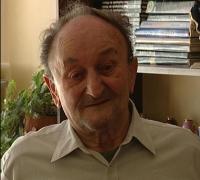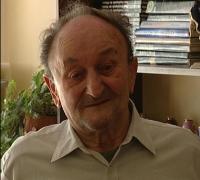You have to take life as you find it. It is necessary to forget embarrassing or painful stages and enjoy yourself. Show a smile. That‘s the point, that is life.

Stáhnout obrázek
Imrich Danko was born on April 18, 1923, in Šášovské Podhradie. His father Gabriel Danko was a train guide and his mother Augustína Danková worked as a housekeeper. He had two siiblings, a brother named Vojtech and a sister named Margita. After passing the exit examinations at the Industrial School of Construction in 1944, he participated in the Slovak National Uprising. He was arrested by the Germans, and imprisoned in Handlová prison for 14 days. After the war he worked as a builder in various cities from Modra to Bratislava. In 1949 he was persecuted by the communist regime and convicted of misappropriation of building materials. He was sentenced to one month of imprisonment in Nitra. On March 30, 1949, he married Edita Pišková, later they welcomed a daughter. During the war, Imrich‘s brother was an officer in the Slovak Army and a participant in the Slovak National Uprising. During the war, Imrich‘s brother was an officer in the Slovak Army and a participant in the Slovak National Uprising. After the war he worked as a notary in Detva. after the communist regime took over the government he had a conflict with his superior. Imrich‘s sister married Pavol Valent, who worked as a technical manager of radio transmitters in Prievoz and Veľké Kostoľany. The transmitters were controlled by the post office at first, but in 1948 they were taken over by the Ministry of the Interior. The State Security soon found out that Vojtech fled and began to hunt him down. In 1952 due to many conflicts with his superiors, Vojtech Danko asked Pavol Valent, who worked in Petržalka district, to help him to flee across the border to Austria. The State Security soon found out that Vojtech fled and a roundup started. During this intense searching for offenders of the so-called conspiracy, Danko was arrested on January 14, 1952. His father, sister and her husband were also taken into custody. When he was arrested, Danko was battered physically and mentally, and eventually confessed to anti-state activities. On March 7, 1953, he was given eight years of imprisonment; his brother in law was sentenced to death, his sister was sentenced to life imprisonment and Imrich‘s father was given eleven years. Imrich served his sentence in many correctional institutions of former Czechoslovakia. During his imprisonment he got divorced with his wife. Thanks to the presidential amnesty he was finally released from prison in 1960.

